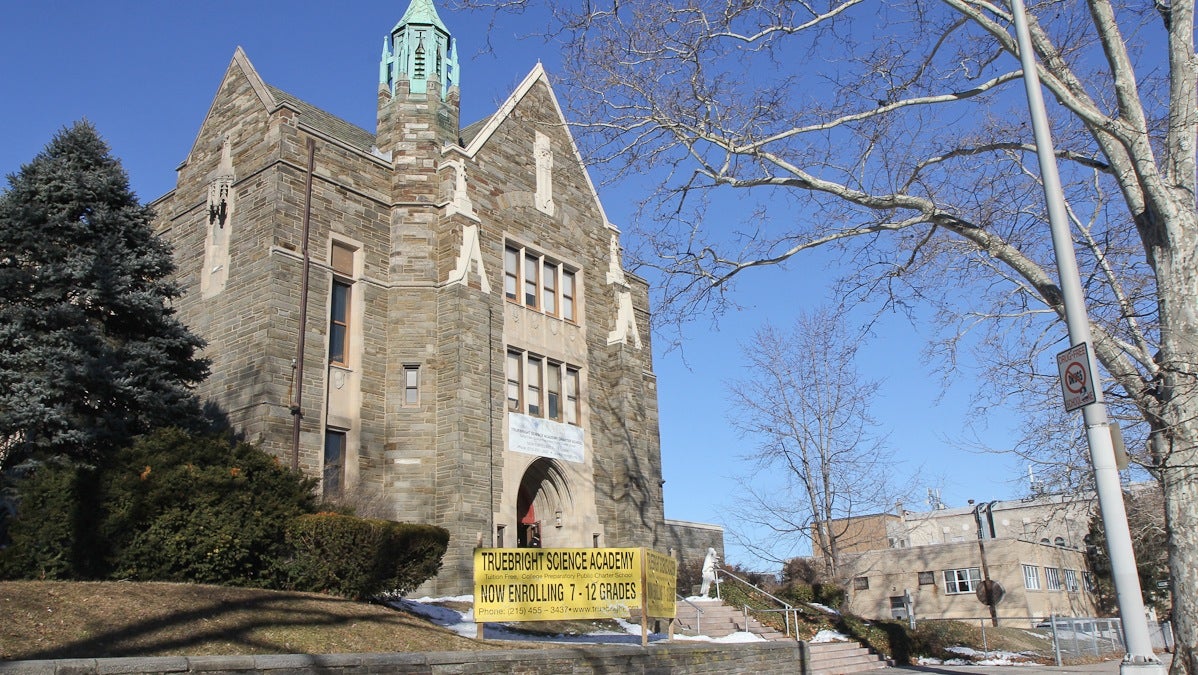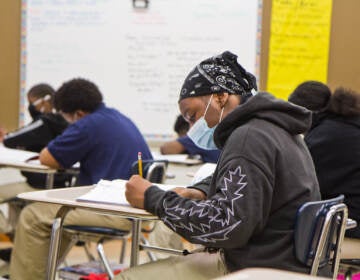Philly’s Truebright charter appeals shutdown order to Pennsylvania Commonwealth Court
Listen
Truebright Science Academy Charter is fighting to stay open after an SRC decision not to renew its charter started the appeals process in 2013. (Kimberly Paynter/WHYY)
Charter schools are supposed to be nimble and innovative, but the process to close an underperforming charter is anything but.
Six weeks after the Charter Appeal Board voted unanimously (7-0) to deny Truebright Academy Science Charter’s bid to stay open, the school in the Olney neighborhood of North Philadelphia has taken its case all the way to Pennsylvania’s Commonwealth Court.
Truebright is one of five Philadelphia charter schools currently going through the non-renewal process. It can take years from when a school district announces the intent not to renew a school’s charter until the classroom doors actually shut permanently.
The Philadelphia School Reform Commission (SRC) notified Truebright that its charter — along with those of Arise Academy and Community Academy — would not be renewed in 2012. A vote formalized that decision in 2013. Both of those schools are still wading through the non-renewal process as well.
At the end of each school’s five-year charter the SRC recommends renewal or non-renewal. The SRC can revoke a charter at any point during a school’s charter term.
Eighteen strikes
The Philadelphia School District voted not to renew Truebright’s charter for not making significant progress or meeting standards for 18 different measures.
According to the SRC’s ruling, these include failing to make “adequate yearly process (AYP) in every year during the Charter School’s current charter term,” failure “to provide adequate academic supports and program implementation for English Language Learners and for students with special needs,” and having fewer than 75 percent of professional staff certified.
In 2011, nine teachers filed unfair hiring complaints against the school, alleging Truebright hired and promoted Turkish nationals, many who lacked teaching certificates, at the expense of more-experienced and certified American-born teachers.
One teacher brought discrimination lawsuit against the school, which was settled out of court in 2013.
The school opened in 2007 and is one of more than 100 charter schools in the United States affiliated with Fethullah Gülen, a Turkish expatriate. Gülen, a preacher, now reportedly lives in exile in the Poconos region.
School District spokesman Fernando Gallard says he believes the Commonwealth Court will uphold the Charter Appeals Board and SRC decisions to close the school. “It’s not just precedent,” said Gallard. “There’s a list of facts driving the non-renewal.”
Legal counsel for the school, Brian Leinhauser, said Truebright’s performance has been skewed to look worse than it is. “We’re trending upwards. District schools are not,” said Leinhauser, pointing to improvements to school’s scores in the School Performance Profile over the last two years.
“Last year our score was in the 40s, this year it’s 51,” said Leinhauser. “Some District schools have scores in the teens.”
Some parents are also advocating to keep the charter’s doors open.
“My son actually hated school before he started going there,” said Annette Hutchful, mother of 15-year-old student Izon Hutchful.
“As far as I see they’re pretty good teachers. My son is doing pretty good, considering he used to be a struggling student,” she said.
“It takes…between two or three years to close a charter.”
Both sides acknowledge that a drawn out charter appeals process takes money away from instruction. Leinhauser, who explained that the school’s legal fees are a line item in the budget, said that money would otherwise go to students.
Of the appeals process spelled out under Pennsylvania’s charter school law, “the process is long and expensive,” said Leinhauser. “I think everyone in the Commonwealth agrees.”
On the side of the district, Gallard said the process for closing a charter takes longer than that of closing a traditional school. “It takes what we have seen between two and three years to close a charter,” said Gallard, who said traditional schools can shut down in under a year.
Leaders at the District believe Truebright to be the longest running non-renewal process.
The Philadelphia School District loses money too. “It freezes some resources we could use in other schools that are performing much higher than the non-renewal schools…so the non-renewal process ends up costing a lot of resources for the public,” said Gallard.
Leinhauser said the school plans to ask for expedited proceedings so that the Commonwealth Court has a chance to rule on the appeal before the start of the 2015-2016 school year.
WHYY is your source for fact-based, in-depth journalism and information. As a nonprofit organization, we rely on financial support from readers like you. Please give today.




